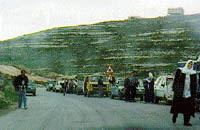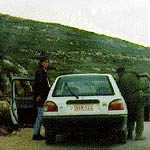
Left: Lines of cars wait for a chance to cross the checkpoint between Ramallah and Birzeit.
"Checkpoint" is a funny word in Palestine. The Hebrew word, Makhsoom, has actually entered the local spoken Arabic and replaced both Hajjez ("barrier") and the rhythmic nuqta tafteesh ("checkpoint"). It doesn't take a student of psychology to realise that this MEANS something. If I was an Israeli, I would be concerned to have left this as one of the psychological legacies of my impact on the Palestinians.
Another, more humourous example of this linguistic colonialism is the use of the Hebrew word for "traffic lights" by Arabic-speaking Palestinians. Basically, for years, Palestinian towns haven't had any, so maybe they go by their Hebrew name.
Since the arrival of the Palestinian Authority, there is now one set of lights in Gaza and another set in Nablus. Traffic police are slowly breaking them in with accompanying gestures. Canadian writer Margaret Atwood calls what I am doing here "survival laughter". I would be interested to see a comparative social-psychological study between Palestine and any other country to see if this coping mechanism is as widespread a tendency as I suspect.

The checkpoints lifted during the two week period every few days for a short while to allow the passage of necessary goods. In the photo here (right), one of Birzeit's visiting international research students has her car taken to bits during a search. I apologise for the quality of some of these checkpoint photos, but I'm sure you can appreciate why. Many soldiers don't like their deeds becoming part of public record which necessitates a nonchalant and less-than-optimal style of photography.
During this period, we read of two or three stories of babies and old men dying at checkpoints. I'll try to dig them out of the archives. For those who heard the Israeli Defence Forces' (IDF) spokesman saying in response that "MOST of the time, emergency service vehicles get through quickly," and find yourself wondering if we are listening to a being from a different planet, rest assured you are right.
And for those who have watched emergency vehicles sit for hours at checkpoints, without being prioritised, know that it is because, according to the IDF spokesperson, "In the past, emergency vehicles have been used to transport terrorists and weapons."
I never heard of that before but I do I remember hearing from a Palestinian doctor in Gaza that IDF undercover units (read "assassination" or "death" squads) often hijacked Palestinian ambulances during the Intifada to carry out operations. Perhaps this is what he was referring to.